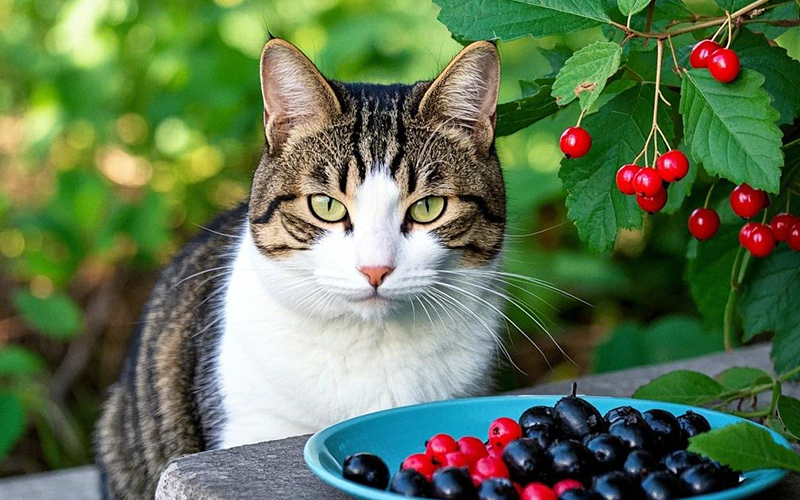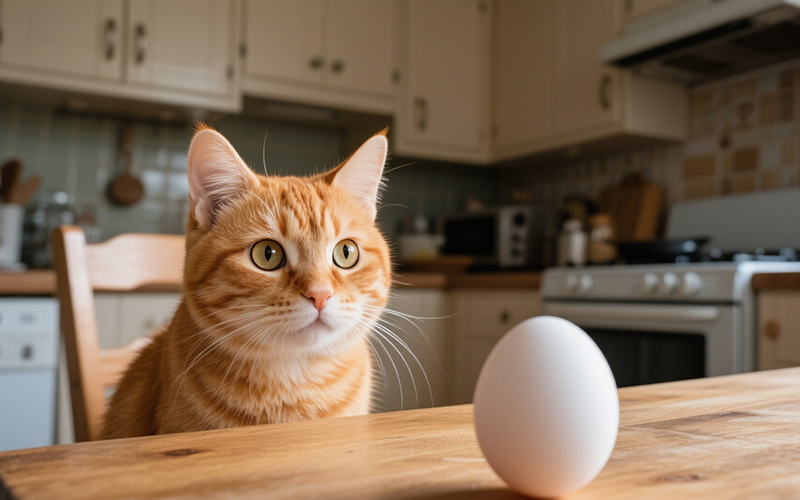Can Cats Eat Berries? A Guide to Safe and Healthy Treats for Your Feline Friend
- 20 Mar 2025 10:05
Berries are a popular and nutritious snack for humans, packed with antioxidants, vitamins, and fiber. But can cats enjoy them too? If your cat seems curious about the berries you're eating, it’s understandable to wonder: Can cats eat berries? Let's explore whether berries are a safe and healthy option for your cat and which types are best to offer in moderation. 🍓🐱

Are Berries Safe for Cats?
The good news is, yes, cats can eat berries, but there are some important things to consider before offering them as a treat. Not all berries are the same, and while most berries are non-toxic to cats, they should only be fed in moderation. Cats are obligate carnivores, meaning their bodies are designed to primarily digest meat, not fruits or vegetables. While berries don’t provide much nutritional benefit for your cat, they can be a fun and tasty treat when given in small amounts. 😊
Types of Berries Cats Can Safely Eat
Here are some common berries that are safe for cats to eat in small amounts:
1. Strawberries
Strawberries are one of the most popular and safest berries for cats. They contain a variety of vitamins and antioxidants, such as Vitamin C and fiber. However, you should remove the stem and cut the berry into small pieces to avoid choking. Strawberries are sweet and juicy, so they can be a refreshing treat for your cat on a warm day. 🍓
2. Blueberries
Blueberries are another cat-friendly berry packed with antioxidants, which are beneficial for their overall health. Blueberries are small, so they can easily be served whole, but always make sure to wash them thoroughly before offering them to your cat. Blueberries can also be frozen to create a cool, refreshing treat. ❄️
3. Raspberries
Raspberries are safe for cats in moderation, and they’re a great source of fiber and antioxidants. Like strawberries, you should cut them into small pieces to ensure they’re easy for your cat to eat. However, too many raspberries can cause digestive upset due to their high fiber content, so moderation is key. 🍇
4. Blackberries
Blackberries, like blueberries, are rich in vitamins and antioxidants. They’re non-toxic to cats, but should also be fed in small quantities. These berries can be a bit larger than blueberries, so it’s best to cut them into smaller pieces to avoid any choking hazards. 🍇
Potential Risks of Feeding Berries to Cats
While berries are generally safe for cats, there are a few important risks to consider:
Sugar Content: Berries, especially strawberries and raspberries, contain natural sugars. Too much sugar can lead to weight gain, obesity, or even diabetes, particularly in cats that are already prone to these conditions. It’s important to offer berries as an occasional treat, not as a regular part of your cat’s diet. 🍬
Digestive Upset: Some cats have sensitive stomachs and may experience diarrhea, vomiting, or other digestive issues after consuming berries, especially if they eat too many. Always introduce new foods slowly and monitor your cat for any signs of discomfort. 🤢
Choking Hazard: Whole berries, especially larger ones like blackberries or strawberries, can be a choking hazard for your cat. Always cut the berries into small, manageable pieces to ensure they’re safe to eat. 🐾
Pesticides and Chemicals: Berries are often treated with pesticides, so it’s crucial to wash them thoroughly before offering them to your cat. If possible, choose organic berries to reduce exposure to harmful chemicals. 🌱
How to Safely Offer Berries to Your Cat
If you decide to offer berries to your cat, here are some tips for doing so safely:
Offer Small Amounts: Stick to a small portion—around 1 or 2 berries at a time. Berries are high in sugar and should be treated as an occasional snack rather than a regular part of your cat’s diet. 🍓
Cut Into Small Pieces: Always cut the berries into small pieces to avoid choking hazards. This is especially important for larger berries like strawberries. 🔪
Wash Thoroughly: Wash berries thoroughly to remove any pesticides or chemicals. If possible, choose organic berries to reduce the risk of exposing your cat to harmful substances. 🧼
Monitor for Reactions: After offering berries, watch for any signs of digestive upset or allergic reactions, such as vomiting, diarrhea, or excessive drooling. If you notice any issues, discontinue giving berries and consult a pet health resource. 🚑
Healthy Alternatives to Berries for Cats
While berries can be a tasty treat, there are many other healthy snacks that are more suited to your cat's dietary needs:
Cooked chicken or turkey: These lean proteins are easy for cats to digest and provide the essential nutrients they need. 🍗
Fish: Small pieces of cooked fish like salmon or tuna are another great protein source for your cat. 🐟
Catnip or cat grass: Fun, safe, and beneficial for your cat’s digestive health. 🌿
These options are much more aligned with a cat’s natural dietary needs and are a safer choice than fruits like berries. 🐾
How PettureX Can Help with Your Cat’s Health
If you're ever unsure about what foods are safe for your cat, PettureX is here to help! 🐱💻 With 24-hour online consultations and pet image recognition, PettureX provides real-time advice on all things related to pet health, including dietary concerns. Whether you’re wondering if a certain food is safe or need advice on your cat’s overall well-being, PettureX is a great resource. 📱
Conclusion
So, can cats eat berries? Yes, cats can eat berries, but only in moderation. Berries like strawberries, blueberries, raspberries, and blackberries are generally safe for cats, but due to their sugar content and potential digestive upset, they should be given sparingly as an occasional treat. Always cut the berries into small pieces, wash them thoroughly, and monitor your cat for any signs of discomfort.
For more information on your cat's diet or any other health concerns, PettureX is always available to provide helpful guidance and support! 🌟🐾
Have you ever shared berries with your cat? Let us know how they liked it! 😺
Related

Can Cats Eat Egg Yolk Raw? A Vet's In-Depth Guide to Feline Nutrition & Safety
- 10 Jun 2025
Can Cats Eat Dog Kibble? Unpacking the Nutritional Mismatch!
- 29 May 2025
Can Cats Eat Deli Turkey? Slicing Through the Facts for Your Feline!
- 29 May 2025
Can Cats Eat Deer Meat? Exploring Venison for Your Feline!
- 28 May 2025
Can Cats Eat Corned Beef? Unpacking This Salty Human Delicacy!
- 28 May 2025
Can Cats Eat Cooked Rice? The Grain Truth for Your Feline Friend!
- 27 May 2025
Can Cats Eat Cornbread? A Crumb of Truth for Curious Cat Owners!
- 27 May 2025
Can Cats Eat Cooked Meat? Sizzling Facts for Your Feline's Feast!
- 26 May 2025
Can Cats Eat Chili? Spicing Up the Truth About This Human Dish!
- 26 May 2025
Can Cats Eat Chicken Eggs? Cracking the Code on This Feline Food Query!
- 24 May 2025
